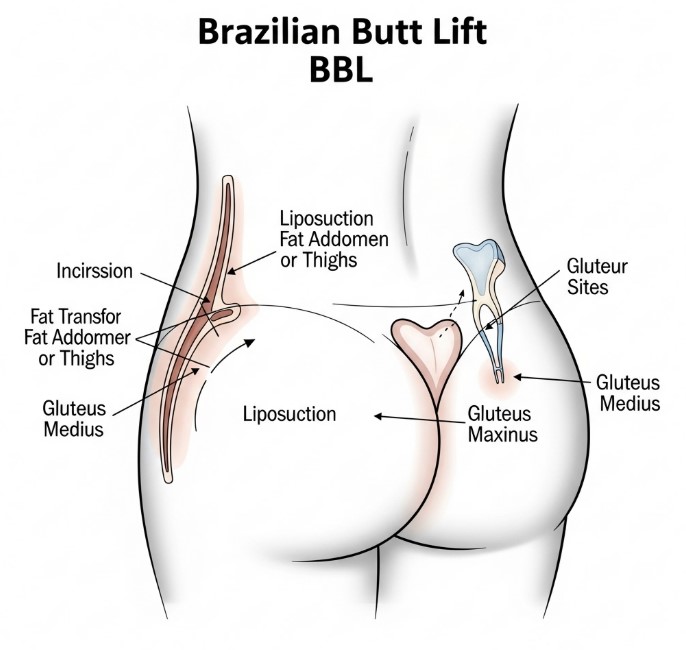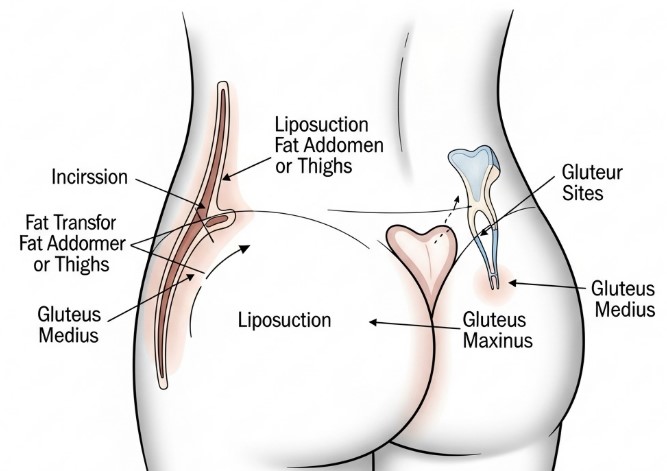The Brazilian Butt Lift (BBL) is one of the most popular cosmetic surgeries in the world, known for enhancing the shape and volume of the buttocks using the patient’s own fat. While the aesthetic results are often celebrated on social media and in pop culture, the less glamorous side effects are rarely discussed — including something often whispered about in forums and online discussions: BBL smell.
Yes, it’s real. And no, it’s not as mysterious or gross as internet rumors make it seem. In this article, we explore what people mean by “BBL smell,” its causes, how long it lasts, and how to handle it properly.
🧠 What Is a BBL, and Why Might It Cause Odor?
A BBL involves liposuction to remove fat from areas like the stomach, thighs, or back, which is then purified and re-injected into the buttocks. The surgery is intense, involves multiple body regions, and requires strict post-op care to prevent complications like infections or fat necrosis.
So where does the “smell” come from?
Here are a few primary causes:
🔬 1. Post-Surgical Drainage and Fluids
After a BBL, the body naturally releases fluid and lymphatic waste through small incisions or drainage points. These fluids can:
- Soak into post-op compression garments.
- Accumulate in gauze or pads.
- Cause a mild to strong odor, especially if not cleaned or changed frequently.
This is not unusual and is often temporary.

🦠 2. Bacterial Build-Up in Healing Incisions
The small incisions from liposuction are typically left open to allow drainage. If hygiene isn’t maintained properly, bacteria can accumulate on the skin or garment surface, leading to a foul smell.
- Not necessarily a sign of infection.
- Usually managed with proper cleaning.
- If smell becomes foul, persistent, or comes with fever or redness, it may indicate an infection and needs medical attention.
🩸 3. Fat Necrosis or Tissue Breakdown
In rare cases, small pockets of fat may die (fat necrosis) during the healing process. This can lead to:
- A cheesy, sour, or rotten smell.
- Discharge from small lumps or areas of firmness.
- Tenderness or inflammation.
This can occur weeks after surgery and often requires drainage or follow-up treatment from a qualified surgeon.
👕 4. Sweat and Compression Garments
Compression garments are worn 24/7 for several weeks post-BBL. These garments trap:
- Sweat
- Body oils
- Fluids
- Bacteria
If not cleaned regularly, the garment itself can produce a strong musky or sour odor that many patients refer to as the “BBL smell.”
📉 5. Poor Hygiene During Recovery
Due to post-op pain and mobility limitations, some patients struggle with:
- Showering regularly
- Reaching affected areas
- Washing garments or bedding
This lack of hygiene can amplify body odor and contribute to a noticeable smell around the surgical sites.
🕒 How Long Does the BBL Smell Last?
The odor typically:
- Peaks within the first 1–2 weeks post-op, when fluid drainage is at its highest.
- Gradually fades as wounds close and the body begins to heal.
- Should significantly improve by week 3 or 4 if proper hygiene and care are maintained.
If the smell persists past a month or is accompanied by pain, pus, or fever, seek medical attention.
🧼 How to Manage and Prevent BBL Smell
Here are practical ways to stay clean and minimize odor during recovery:
✅ 1. Clean Your Compression Garments Daily
- Buy multiple garments so you can rotate.
- Wash with antibacterial detergent.
- Air dry thoroughly.
✅ 2. Use Antibacterial Wipes or Sponge Baths
- If full showers are difficult, use no-rinse antibacterial wipes or chlorhexidine soap to clean gently.
✅ 3. Change Gauze and Pads Frequently
- Change dressings 2–3 times a day or when soaked.
- Use breathable, absorbent materials.
✅ 4. Stay Hydrated and Eat Well
- A balanced diet helps with healing and reduces chances of fat necrosis.
- Avoid sugary, processed foods that increase inflammation.
✅ 5. Attend All Post-Op Appointments
- Let your surgeon inspect healing wounds.
- Report any unusual discharge, odor, or pain immediately.
🧠 What the Internet Gets Wrong About “BBL Smell”
On TikTok, Reddit, and other forums, “BBL smell” is often mocked or exaggerated. In reality:
- It is not unique to BBLs — most surgeries involving drainage can result in some odor.
- It does not mean you’re unhygienic or infected — it’s a normal part of healing for many.
- It is manageable with good care and hygiene routines.
🧪 When to Worry: Signs of Infection
If any of the following occur alongside a foul odor, seek medical help immediately:
- Fever over 38°C (100.4°F)
- Redness or swelling around incisions
- Thick, colored pus-like discharge
- Persistent pain or hard lumps
- A worsening smell that doesn’t go away
These could indicate infection, seroma, or fat necrosis — all treatable, but not to be ignored.
👩⚕️ Final Thoughts: Be Kind to Your Healing Body
Undergoing a BBL is a serious decision, and like all surgeries, comes with a recovery process that includes discomfort, adjustments, and yes — sometimes odd smells. Instead of being ashamed or alarmed, understanding what’s normal and how to take care of your body can empower you to have a safe, healthy recovery.
The BBL smell isn’t permanent, and it doesn’t mean something is wrong — it just means your body is healing. Treat it with patience, care, and medical guidance when needed.

